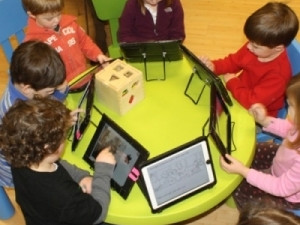
No more pencils, no more books?
Back-to-school shopping used to involve purchasing dozens of spiral notebooks, some for doodling rather than note-taking. Tablets take the place of all of that by allowing students to record and type their notes digitally. Paper is by no means out of the picture, but it does mean less paper, which translates to fewer downed trees.
End of the textbook
Tablets can and are replacing textbooks. According to Conservatree, it takes 12 trees to make one ton of paper, meaning one tree produces 34 average-size textbooks - not enough for one student in their lifetime, let alone all students. Once again, converting to digital goes a long way to reducing the number of trees used each year.
No reprints needed
Tablets don't just save paper the first time around. The norm with textbooks is that the information more often than not quickly becomes outdated. Publishing houses then have to push out thousands of new, updated versions, which means millions of printed pages, many of them unchanged, all for the latest version. With tablets, these updates are delivered to millions instantly.
Motivation to produce new content
There is the argument that entire industries may end as it becomes less and less profitable to publish. However, new industries are forming, such as paid access to the original authors, subscription-based content and more.
E-waste
There is a strong argument that e-waste (waste from technology) is a major factor. The question is where are we net winners and net losers. The jury is still out on that one, but going digital seems to be winning the argument so far.
So, when you decide to go digital, whether it's for the sake of your learners or the environment (or both), we at CPS Technologies are ready to provide you with your tablet charging and safe storage solutions.
Share
Editorial contacts